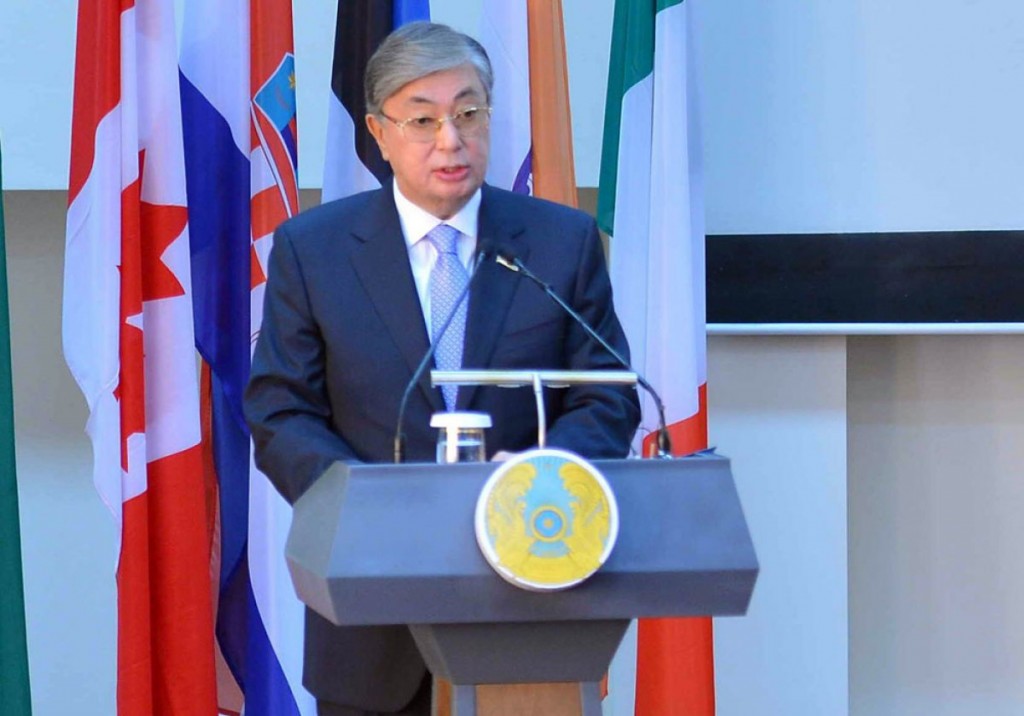Developing a new paradigm focused on solving global challenges was recently discussed for the first time at the G-Global platform.
 An international conference titled “A New Paradigm of Sustainable Human Development: G-Global – A New Form of Global Dialogue” took place at the Al-Farabi Kazakh National University in Almaty Nov 5-7. The platform is a unique global dialogue of intellectuals, recognised public and state figures and prominent foreign and domestic experts.
An international conference titled “A New Paradigm of Sustainable Human Development: G-Global – A New Form of Global Dialogue” took place at the Al-Farabi Kazakh National University in Almaty Nov 5-7. The platform is a unique global dialogue of intellectuals, recognised public and state figures and prominent foreign and domestic experts.
Speaker of Kazakhstan’s Senate Kassym-Jomart Tokayev delivered a keynote address at the conference and talked about sustainable human development and security and the role of the G-Global initiative in that process.
“The theme of this conference is very acute. Contemporary challenges have created a need for a new paradigm on global development. That is why Kazakhstan is helping to tackle this problem. President Nursultan Nazarbayev launched the G-Global initiative in hopes of uniting the international community in establishingand securing peace for the world. This initiative offers an absolutely new form of global discussion. There is no doubt over the accomplishments of the elite G8 and G20 groups, yet we believe that the world should listen to the views of other countries and hear their proposals on current developments. In our opinion, such a redistribution of global roles is more consistent with the principles of democracy and inclusive responsibility and it pays due regard to the needs of a multipolar world,” Tokayev said.
 He went on to state that sustainable development requires political stability. As history shows, such guarantors of stability, as a rule, are democracies. But democratisation is an evolving trend that cannot be artificially accelerated or imposed, Tokayev maintained. Historical experience, cultural traditions and the uniqueness of the national mentality of each state must be taken into account. The experiences of Afghanistan, Iraq, Libya and Egypt show that building democracy requires political tact and an extremely thoughtful, responsible and patient approach, stressed Tokayev.
He went on to state that sustainable development requires political stability. As history shows, such guarantors of stability, as a rule, are democracies. But democratisation is an evolving trend that cannot be artificially accelerated or imposed, Tokayev maintained. Historical experience, cultural traditions and the uniqueness of the national mentality of each state must be taken into account. The experiences of Afghanistan, Iraq, Libya and Egypt show that building democracy requires political tact and an extremely thoughtful, responsible and patient approach, stressed Tokayev.
He noted that Kazakhstan is interested in strengthening international cooperation to ensure global sustainable development. President Nazarbayev’s Kazakhstan 2050 Strategy reflects Kazakhstan’s vision for long-term development and it should be carefully studied by foreign experts, he concluded.
The Almaty conference was organised by the World Academy of Art & Science, the World University Consortium and Al-Farabi Kazakh National University in partnership with a consortium of leading international organisations, research institutes and universities to examine theoretical foundations and policy framework.
Co-organisers include the Club of Rome and Madrid, Green Cross International, as well as major international public associations, universities and foundations. The consortium brought together international organisations such as the the International Labour Organisation (ILO), the United Nations Educational, Scientific and Cultural Organisation (UNESCO), the UNDP (the United Nations Development Programme), the Organisation for Economic Co-operation and Development (OECD), the European Movement International, the World Fund for Future Development and many more.
This forum has been held in both Europe and the Americas. This year, by a decision of the organising committee, the high-profile event was held in Kazakhstan. The conference consisted of four trans-disciplinary, inter-related tracks focused on issues related to governance, international security, human rights and law; economics and finance; employment, education and human development: and energy, resources and climate.


